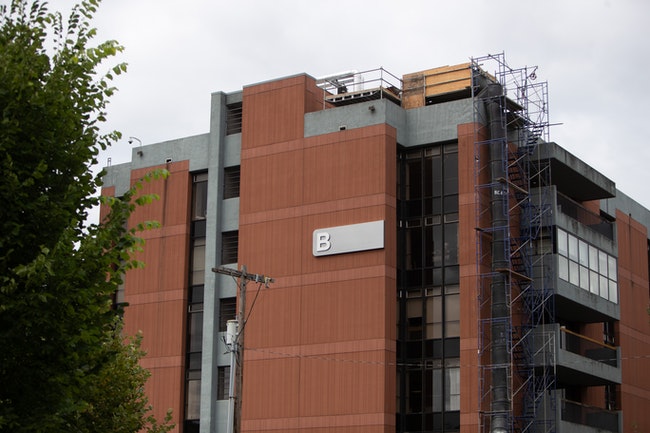
Salem Hospital (Amanda Loman/Salem Reporter)
One of the Salem Hospital patients infected with a strain of drug-resistant yeast is responding well to treatment, and two others have shown no signs of infection despite testing positive for the fungus, health officials said.
Salem Health and the Oregon Health Authority on Tuesday publicly announced the first recorded Oregon cases of Candida auris had been found at the hospital earlier this month.
Dr. Jasmin Chaudhary, Salem Health’s medical director of infection prevention, and Dr. Dat Tran, medical director of the Oregon Health Authority’s healthcare associated infections program, gave more details about the outbreak in a Wednesday afternoon interview with Salem Reporter.
Candida auris is an “emerging pathogen of concern” because it is often resistant to multiple antifungal drugs and can cause serious infections in people with compromised immune systems and those who have spent significant time in the hospital with catheters or other tubes and lines in their bodies, according to the Centers for Disease Control and Prevention.
“It’s a bug for which we sometimes have limited therapeutic options, and for those reasons, we’re always very concerned,” Tran said. “This is the first series of cases that we’ve seen in Oregon, so we just want to do our best and are being very aggressive in collaboration with Salem Health, to contain and prevent this bug from spreading within Oregon.”
The risk to healthy people and health care workers is low.
“Generally, we’re not concerned when it has to do with healthy people. This is not something that’s going to infect healthy people,” Chaudhary said.
The first patient who came to the hospital with the infection “had extensive international hospitalizations, multiple hospitalizations overseas,” Chaudhary said. That’s likely where the patient acquired the infection.
The infection was detected in that patient on Dec. 11 and confirmed Dec. 17, hospital officials said.
The fungus then spread to two other hospital patients, who tested positive on Dec. 23 and 27, respectively.
Of those three patients, Chaudhary said only one is showing signs of infection due to the fungus and is responding well to existing antifungal treatments, meaning that this strain of the yeast is not resistant to all drugs.
The other two, Chaudhary said, were “colonized” by the yeast – a medical term meaning it was found in their bodies or on skin – but have shown no signs of infection or illness as a result.
She declined to say which of the three patients has an active infection, citing medical privacy.
All patients on the three units affected are being screened for the fungus.
After pausing discharges for patients on those units, Salem Health lifted the hold after putting a plan in place to prevent the infection from spreading, a spokeswoman said Thursday.
Chaudhary said the hospital is working to determine how the fungus spread in the hospital and practicing “aggressive” infection control, including disinfection and handwashing.
“No patient harm is acceptable to us and that’s why we acted very aggressively from the very start,” she said. “Salem Health remains a safe place to receive care. Patients should remain confident in their care here.”
Twenty-three other health care and long-term care facilities may have received patients from affected units before the first case was confirmed Dec. 17. Tran said OHA is working with Salem Health to screen all patients at those facilities for the yeast.
“The risk is probably low but … we want to contain this Candida auris,” Tran said. “It’s a significant amount of work and a significant lift but I think it’s important to do this work upfront and be aggressive upfront.”
Jonathan Modie, Oregon Health Authority spokesman, said agency officials made the decision to wait to inform the public about the pathogen until additional cases were confirmed.
“We needed to wait both for confirmation that the other cases were, indeed, C. auris, and also whether the organism was pan-resistant to antifungal medications as seen in other jurisdictions (it was not identified to be pan-resistant and is, therefore, treatable). This is key information to inform the public about risk,” Modie said in an email.
Any additional cases found will be announced publicly, Modie said.
This article was updated Thursday at 3:20 p.m. to reflect that discharges from affected units have resumed.
Contact reporter Rachel Alexander: [email protected] or 503-575-1241.
JUST THE FACTS, FOR SALEM – We report on your community with care and depth, fairness and accuracy. Get local news that matters to you. Subscribe to Salem Reporter starting at $5 a month. Click I want to subscribe!









